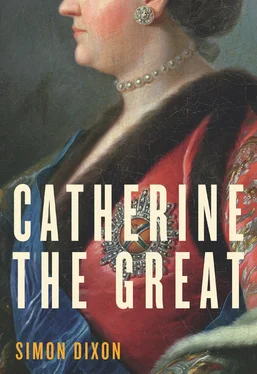At the beginning of April 1769, Vladimir Orlov reintroduced her to Ivan Kulibin, the inventor from Nizhny Novgorod whose clock in the form of a mechanical toy egg struck the hour with Easter tunes and opened to reveal a scene of the Resurrection, played out by miniature figures done in gold and silver. Catherine rewarded him with 1000 roubles. 57God seemed firmly on her side when campaigning opened just before her fortieth birthday. General A. M. Golitsyn was her commander-in-chief, appointed as a compromise between two more distinguished candidates: General Peter Panin (favoured by his brother, Nikita) and General Peter Rumyantsev (supported by Grigory Orlov against the Panins). 58When news of his first victory at Khotin, the main Turkish fort on the Dniester, reached Tsarskoye Selo on the afternoon of 30 April, Catherine called her courtiers into the dining room to deliver the glad tidings herself. ‘The Turkish camp is taken,’ she informed Saltykov next day, ‘along with a great number of trophies and prisoners. Our losses were almost nil, since the enemy cannon fired over our heads.’ That morning, the Court travelled to St Petersburg for a thanksgiving service at the Kazan Church where she made sure Paul was present. A jubilant crowd lined the streets to join the celebrations. 59Soon there were more. By 10 May, Catherine was delighted to report that Golitsyn had defeated another 30,000-strong Turkish army. 60
Confident of his further progress, she relaxed at Gatchina, where Rinaldi’s building work was advancing apace, and where she and Grigory Orlov strolled through the park to see the pheasants in the menagerie after Lev Naryshkin had played the violin for them in the new wooden apartments on 15 May. Eight days later, Zakhar Chernyshëv and Praskovya Bruce joined the three of them at the dacha at Bronnaya, where they sat up all night playing cards to watch the long-awaited transit of Venus through a telescope set up by Paul’s science tutor, Professor Aepinus (the Russian Academy of Sciences played a central part in the world-wide observations of the event). 61Military matters loomed larger at the beginning of June, when Grigory, acting in his capacity as Master of the Ordinance, took Catherine on a tour of the Liteyny cannon foundry in St Petersburg attended by all her artillery generals. Not that the common people were forgotten. At the accession day celebrations in the Dutch Hall at Monplaisir, the empress made a patriotic gesture by proposing a new toast ‘to all her subjects’ after the usual toasts to herself and the heir to the throne. 62
The summer brought more disconcerting news. Catherine’s early boasts were made to seem embarrassing when adroit manoeuvring by the Ottomans forced Golitsyn to retreat across the Dniester, abandoning his earlier gains. Yet no sooner had she given orders to sack him on 13 August than he embarrassed her again by retaking Khotin in September. That was a more pardonable offence. ‘The tsarina is drunk with joy,’ reported the appalled French ambassador. ‘Her health, which had been crushed by the reverses, is visibly restored.’ 63Until then, the atmosphere had indeed been tense in St Petersburg, where rumours of conspiracies and mysterious disappearances circulated in the sort of ‘confidential whispers’ that Richardson attributed to a people ‘prohibited from speaking or writing about politics’:
The Empress tells them, that as her maternal care for her dear people keeps her sleepless by night, and busy by day—and I really believe that her nights are as sleepless as her days are busy—they have no occasion to give themselves any further trouble about public affairs, than to act implicitly as she directs…Happy king of England! who may go about with as much security after a defeat, as after a victory; who has no occasion for a board of spies against his own subjects; and may allow his people to speak, write, and think as they please. 64
Richardson’s timing could hardly have been less felicitous. Far from spurning public opinion, Catherine was even keener to nurture it in the aftermath of the abortive Legislative Commission. Now that it was clear that the ideas she had borrowed from Montesquieu and Beccaria were unrecognisable to the majority of Russian nobles, she tried another tack. Posing as ‘Granny’ ( Babushka ), the benign editorial persona of a new journal, All Sorts , at the beginning of 1769, Catherine tried to coax her subjects to improve their manners by mocking their bad habits in light-hearted journalism in the tradition of Addison and Steele’s Spectator . Much of their material was indeed paraphrased in Catherine’s journal, which openly acknowledged its debt to its progenitor: ‘There is not a little salt in the English Spectator , and All Sorts resembles it, so why should it not contain something useful for society?’ 65Although she was still a woman in a hurry—‘We have no doubts regarding the speedy correction of morals and expect an immediate extirpation of all vices’, Granny confidently declared—Catherine permitted a degree of playful banter between her own journal and others in the same vein published by Nikolay Novikov, a former minute-taker at the Legislative Commission who was as keen as she was to disperse the clouds of prejudice and injustice. 66His journal The Drone mocked corrupt judges who had unaccountably failed to read Beccaria On Crimes and Punishments and understood as little of their own duties as they did of the Syrian and Khaldean languages: ‘O enlightenment, heavenly gift, lift the veil of ignorance and cruelty swiftly for the defence of humanity!’ 67
Although it remains a mystery why Catherine chose to encourage public discussion of the defects of Russian society at the start of her war with the Turks, her turn to journalism was entirely of a piece with the first of five aims she had once jotted down under the heading ‘Maxims of Administration’: ‘One must refine the nation one is to govern.’ 68Conscious of the benefits of her own reading, she paid 5000 roubles a year to support a Society for the Translation of Foreign Books, founded in November 1768 under the aegis of her secretary Grigory Kozitsky, a graduate of the Kiev Spiritual Academy who had studied in Leipzig. Kozitsky translated her Instruction into Latin and Ovid’s Metamorphoses into Russian before committing suicide in December 1775. (‘He was in bed with his wife,’ Jeremy Bentham learned later, ‘who finding herself wet in the morning spoke to her husband, and receiving no answer, drew aside the Cloaths and found him with a penknife in his hand, dead, with upwards of 30 wounds about him.’) 69The Society’s life lasted longer. More than forty titles were in print by 1772, and by the time its work was transferred to the newly created Russian Academy in 1783, 112 translations had been published with a further 129 still in progress. Many of the first works to appear were extracts from the Encyclopédie which reflected the empress’s current interest in Greece and the Mediterranean. Boswell’s Corsica came out in 1773. Fielding’s Joseph Andrews and Swift’s Gulliver’s Travels may well have reflected her personal tastes (Catherine read English literature in French and German translation). Corneille and Voltaire were also on the list. 70
Though she confessed to Voltaire in March 1771 that she was ‘too busy fighting’ to contemplate a widespread implementation of her Instruction, such a burst of intellectual activity helped to create an atmosphere in which the empress might reasonably think that her treatise had not been in vain. That autumn, Novikov published a number of positive European responses to it in his journal The Painter . 71Archbishop Platon had offered more explicit reassurance in his New Year sermon, given in her presence at the Winter Palace. ‘Our age is the age of enlightenment,’ he proclaimed in his most fulsome acknowledgement of the achievements of secular reform, going on to praise impartial judges for bringing clarity to Russian legislation, in words which echoed Catherine’s own, and to praise her for stressing the need for moderate punishments. The aim was to destroy vice itself, rather than the unhappy criminal. ‘Never, indeed, has a government incorporated so abundantly the spirit of guardianship and philanthropy.’ 72On her forty-second birthday in April, the empress began a memoir designed to highlight the uncivilised features of Elizabeth’s Court. So it came as a shock when she discovered in May that her own servants were still being dragged off to the palace candle factory to be flogged, just as they had been when she first arrived in Russia. Since this was an ‘evil custom’ that she had banned at the beginning of her reign, she expressed outrage that it had been revived. Henceforth, no liveried servant was to be beaten on any account. ‘If some of them commit a major crime such as theft, then they should be stripped of their livery and sent to the criminal courts. Attempts should be made to correct drunks, defaulters and the disobedient by: 1) gentleness, and if that doesn’t work: 2) detention. 3) The punishment should be 48 hours on bread and water.’ 73
Читать дальше












